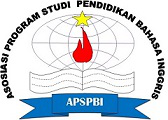Unraveling Implicature in Racial Humor Stand-Up Comedy on YouTube
Abstract
Humor is a form of communication with the intention to implicitly express meaning by exposing a sense of comedy. The primary focus of this thesis is to investigate implicatures in stand-up comedy, which are then categorized according to the type of humor and to observe how stereotype racial issue depicted through implicatures in stand-up comedy. This thesis examines the implicatures found in stand-up comedy with the underlying topic of racial humor on YouTube. This thesis is a qualitative research using documentation techniques and data cards as a research instrument. It utilizes Yule's implicature theory and David Hector Monro’s Theories of Humor. This thesis is limited to only 4 comedians with different backgrounds; Maz Jobrani, Hasan Minhaj, Jimmy O. Yang, and Gabriel Iglesias. The study found three categories of humor: superiority, incongruity and release. Incongruity is a major finding because it aligns with the characteristics of stand-up comedy which is to express genuinely miserable concepts while combining them with humor. This thesis discovered that the comedian's punchline indicated the existence of stereotypes regarding specific racial groups. The racial stereotype humor found is dominated by the Middle East, such as Iran, Arabia, and Indian. In addition, another finding in this thesis is the construction of Chinese identity. It can be inferred from the findings that humor belongs for particular occasions. People can use humor to express implicit meaning and to define their identity.
Keywords
Full Text:
PDFReferences
Abdulasalam, T., & Ja’afar, I. H. (2021). Pragmatic analysis of racial humor in online discourse. International Journal of Linguistics, Literature and Culture, 7(6), 489–498. https://doi.org/10.21744/ijllc.v7n6.1968
Adekunle, I. J. (2023). Stand-up Comedy as Contemporary Live Theatre.
Amelia, D. (2022). AN ANALYSIS OF RACIAL PROFILING IN DEAR MARTIN NOVEL BY NIC STONE. 3(2).
Arshed Sadoun Atei, Q. O. A.-A. (2022). Racial Jokes on Twitter: A Pragmatic Study. https://doi.org/10.5281/ZENODO.6189761
Attardo, S. (1994). Linguistic theories of humor. Mouton de Gruyter.
Attardo, S. (2017). Humor in Language. In S. Attardo, Oxford Research Encyclopedia of Linguistics. Oxford University Press. https://doi.org/10.1093/acrefore/9780199384655.013.342
Bornstein, M. H., Bohr, Y., & Hamel, K. (2020). Immigration, Acculturation, and Parenting.
Calhoun, K. (2019). Vine Racial Comedy as Anti‐Hegemonic Humor: Linguistic Performance and Generic Innovation. Journal of Linguistic Anthropology, 29(1), 27–49. https://doi.org/10.1111/jola.12206
Cancer. (2022, February 3). Retrieved from World Health Organization: https://www.who.int/news-room/fact-sheets/detail/cancer
Cano-Lozano, M. C., Rodríguez-Díaz, F. J., León, S. P., & Contreras, L. (2020). Analyzing the Relationship Between Child-to-Parent Violence and Perceived Parental Warmth. Frontiers in Psychology, 11, 590097. https://doi.org/10.3389/fpsyg.2020.590097
Creswell, J. W. (2014). Research Design: Qualitative, Quantitative, and Mixed Methods Approaches.
Chen, P.-Y., & Soo, V.-W. (2018). Humor Recognition Using Deep Learning. Proceedings of the 2018 Conference of the North American Chapter of the Association for Computational Linguistics: Human Language Technologies, Volume 2 (Short Papers), 113–117. https://doi.org/10.18653/v1/N18-2018
Friedman, H. H., & Friedman, L. W. (2019). Laughing Matters: When Humor Is Meaningful. Journal of Intercultural Management and Ethics, No. 4, 55–72. https://doi.org/10.2139/ssrn.3418980
Gupta, K. (2018). India Is The Hardest Working Country, 69% Say They Are Happy With Working Five-Days A Week. India Times. https://www.indiatimes.com/news/india/india-is-the-hardest-working-country-69-say-they-are-happy-with-working-five-days-a-week-352899.html
Han, Y., & Chen, J. (2019). “We Were Not at School Today”: First-Person Pronouns and Discursive Construction of Identities by Emerging Middle-Class Chinese Parents. Chinese Journal of Applied Linguistics, 42(3), 285–306. https://doi.org/10.1515/CJAL-2019-0018
Mohamed, B., & Bnini, C. (2020). Analyzing the Incongruity Theory of Humor: George Carlin’s Stand-up Comedy as a Case Study. International Journal of Sciences, 54(5).
Monro, D. H. (1963). Argument of laughter. University of Notre Dame Press.
Nabawi, F. S. (2021). Implicatures in stand-up comedy by Kevin Hart on YouTube videos. UIN Sunan Gunung Djati.
Nolen, J. L. (2023). Guantánamo Bay detention camp. Retrieved from Britannica: https://www.britannica.com/topic/Guantanamo-Bay-detention-camp
Perez, R. (2022). The Souls of White Jokes. Stanford University Press.
Rajan, S., Navaneetham, J., Philip, M., & Muralidhar, D. (2020). Young adults’ perception of parenting style: A retrospective exploration. Social Health and Behavior, 3(1), 17. https://doi.org/10.4103/SHB.SHB_48_19
Reza, F. (2020). Parenting Styles and Discipline Strategies of Immigrants: A Qualitative Study. Universal Journal of Educational Research, 8(12B), 8402–8410. https://doi.org/10.13189/ujer.2020.082646
Sahithya, B. R., Manohari, S. M., & Vijaya, R. (2019). Parenting styles and its impact on children – a cross cultural review with a focus on India. Mental Health, Religion & Culture, 22(4), 357–383. https://doi.org/10.1080/13674676.2019.1594178
Saleh, F., Al Mulhim, M., & Ciottone, G. (2022). Terrorist Attacks in the Middle East: A Counter-Terrorism Medicine Analysis. Prehospital and Disaster Medicine, 212 - 216.
Sierra, S. (2019). Linguistic and ethnic media stereotypes in everyday talk: Humor and identity construction among friends. Journal of Pragmatics, 152, 186–199. https://doi.org/10.1016/j.pragma.2018.09.007
Stansifer, C. L., Anderson, T. P., & Griffith, W. J. (2023, August). Guatemala. Retrieved from Britannica: https://www.britannica.com/place/Guatemala
Taylor, S. (2015). Identity Construction. In The International Encyclopedia of Language and Social Interaction (pp. 1–9). John Wiley & Sons, Inc. https://oro.open.ac.uk/39246/2/IDENTITY%20CONSTRUCTION%20Revised%20TAYLOR.pdf
Takovski, A. (2018). Extending ethnic humour theory: Genuine vs. functional ethnic jokе scripts. The European Journal of Humour Research, 6(2), 60–80. https://doi.org/10.7592/EJHR2018.6.2.254.takovski
Vytiaz, A. (2018). YOUTUBE – A NEW ERA OF TV? [Masaryk University]. https://www.researchgate.net/publication/328874004_Youtube_-_a_new_era_of_TV#:~:text=7-,INTRODUCTION,and%20share%20their%20videos.
WHAT ISIS REALLY WANTS. (2015, March). Retrieved from The Atlantic: https://www.theatlantic.com/magazine/archive/2015/03/what-isis-really-wants/384980/
Zibrikahn, A. (2018, January). Why do Arab speakers have loud voices? Retrieved from Quora: https://www.quora.com/Why-do-Arab-speakers-have-loud-voices
DOI: http://dx.doi.org/10.20527/jetall.v7i1.18506
Article Metrics
Abstract view : 202 timesPDF - 133 times
Refbacks
This journal is indexed in:


This Journal is listed in:
 Journal of English Teaching, Applied Linguistics and Literatures (JETALL)
Journal of English Teaching, Applied Linguistics and Literatures (JETALL)








.png)



1.png)
